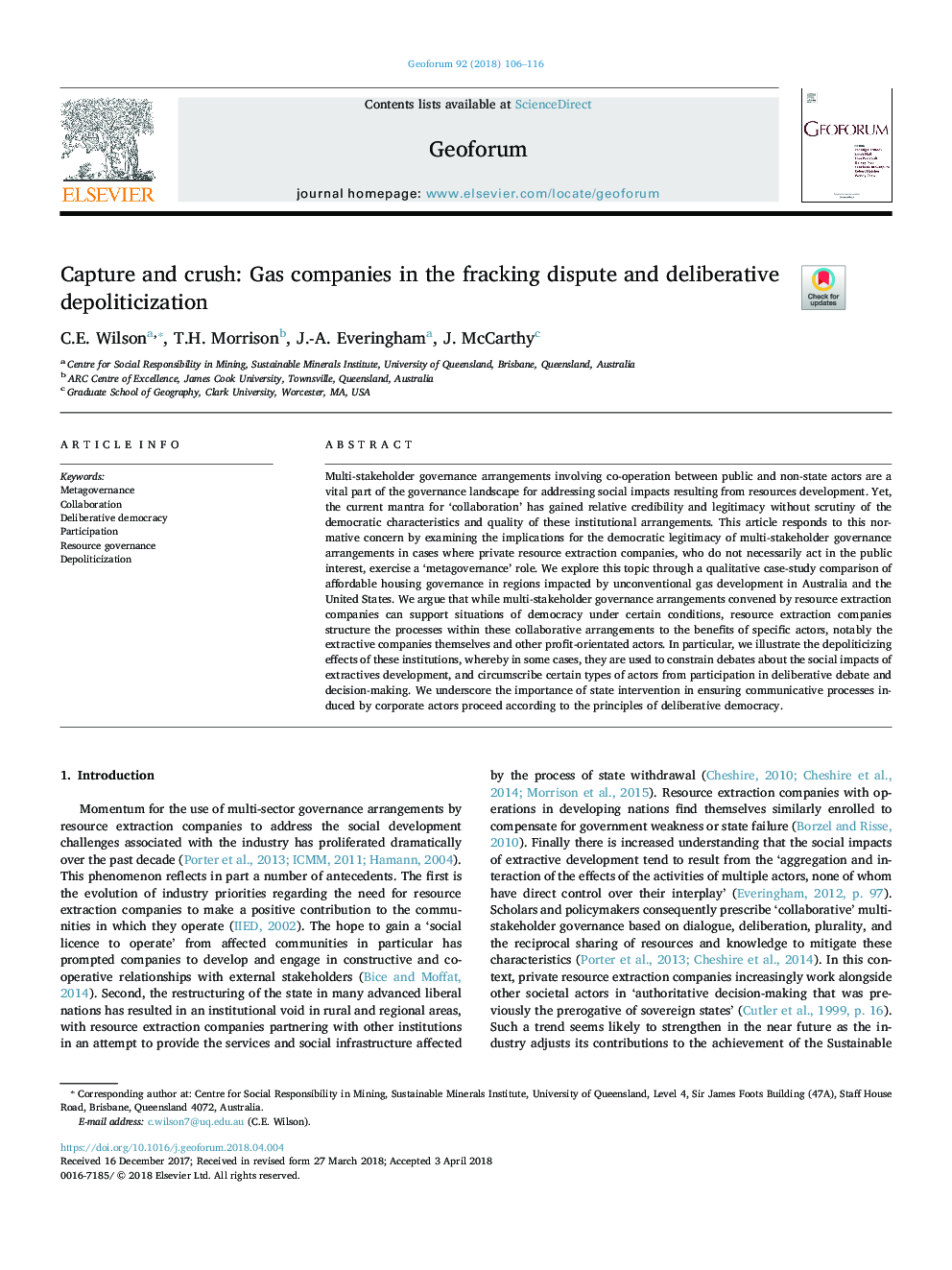| کد مقاله | کد نشریه | سال انتشار | مقاله انگلیسی | نسخه تمام متن |
|---|---|---|---|---|
| 7353522 | 1477097 | 2018 | 11 صفحه PDF | دانلود رایگان |
عنوان انگلیسی مقاله ISI
Capture and crush: Gas companies in the fracking dispute and deliberative depoliticization
ترجمه فارسی عنوان
ضبط و خرد کردن: شرکت های گاز در اختلاف فرسایش و اختلافات مشورتی
دانلود مقاله + سفارش ترجمه
دانلود مقاله ISI انگلیسی
رایگان برای ایرانیان
کلمات کلیدی
متا مدیریت همکاری، دموکراسی مذهبی، مشارکت، مدیریت منابع، اعتیاد به مواد مخدر،
ترجمه چکیده
توافقنامه های چند منظوره ای که شامل همکاری بین بازیگران دولتی و غیر دولتی می شود، بخش مهمی از منظر حکومتی برای رسیدگی به تأثیرات اجتماعی ناشی از توسعه منابع است. با این حال، ماتریال کنونی «همکاری» اعتبار و مشروعیت نسبی را بدون بررسی ویژگی های دموکراتیک و کیفیت این توافقات سازمانی به دست آورده است. این مقاله به این نگرانی هنجاری پاسخ می دهد و با بررسی معانی مشروعیت دموکراتیک نظارت بر نظارت های چند جانبه ای در مواردی که شرکت های استخراج منابع خصوصی که لزوما به نفع عمومی عمل نمی کنند، نقش "متا مدیریت" را ایفا می کنند. ما این موضوع را با بررسی یک مطالعه کیفی کیفی وضعیت حکومت مسکن مقرون به صرفه در مناطق تحت تأثیر توسعه گاز غیر متعارف در استرالیا و ایالات متحده بررسی می کنیم. ما استدلال می کنیم که در حالی که نظارت های چند جانبه ای که توسط شرکت های استخراج منابع ایجاد شده می توانند در شرایط خاصی از شرایط دموکراسی حمایت کنند، شرکت های استخراج منابع فرایندهای درون این توافقات همکاری را به مزایای بازیگران خاص، بویژه شرکت های استخراجی و دیگر سودآور بازیگران. به طور خاص، ما اثرات تخریب پذیری این مؤسسات را نشان می دهیم، و در بعضی موارد، آنها برای محدود کردن بحث درباره تأثیر اجتماعی توسعه استخراج معادن و محدود کردن نوع خاصی از بازیگران از مشارکت در بحث های مشورتی و تصمیم گیری استفاده می شود. ما اهمیت مداخله دولت را در تضمین فرایندهای ارتباطی ایجاد شده توسط بازیگران شرکتی مطابق اصول دموکراسی مشورتی ادامه می دهیم.
موضوعات مرتبط
علوم انسانی و اجتماعی
اقتصاد، اقتصادسنجی و امور مالی
اقتصاد و اقتصادسنجی
چکیده انگلیسی
Multi-stakeholder governance arrangements involving co-operation between public and non-state actors are a vital part of the governance landscape for addressing social impacts resulting from resources development. Yet, the current mantra for 'collaboration' has gained relative credibility and legitimacy without scrutiny of the democratic characteristics and quality of these institutional arrangements. This article responds to this normative concern by examining the implications for the democratic legitimacy of multi-stakeholder governance arrangements in cases where private resource extraction companies, who do not necessarily act in the public interest, exercise a 'metagovernance' role. We explore this topic through a qualitative case-study comparison of affordable housing governance in regions impacted by unconventional gas development in Australia and the United States. We argue that while multi-stakeholder governance arrangements convened by resource extraction companies can support situations of democracy under certain conditions, resource extraction companies structure the processes within these collaborative arrangements to the benefits of specific actors, notably the extractive companies themselves and other profit-orientated actors. In particular, we illustrate the depoliticizing effects of these institutions, whereby in some cases, they are used to constrain debates about the social impacts of extractives development, and circumscribe certain types of actors from participation in deliberative debate and decision-making. We underscore the importance of state intervention in ensuring communicative processes induced by corporate actors proceed according to the principles of deliberative democracy.
ناشر
Database: Elsevier - ScienceDirect (ساینس دایرکت)
Journal: Geoforum - Volume 92, June 2018, Pages 106-116
Journal: Geoforum - Volume 92, June 2018, Pages 106-116
نویسندگان
C.E. Wilson, T.H. Morrison, J.-A. Everingham, J. McCarthy,
